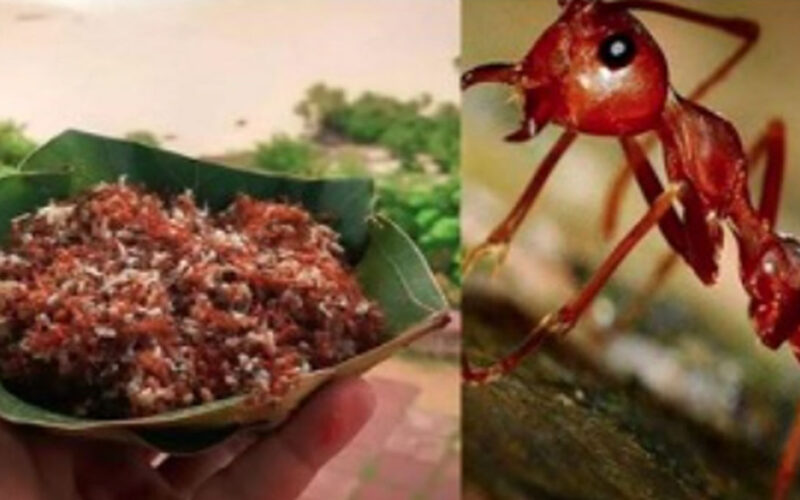January 18, 2024: The tribal communities of Mayurbhanj district in Odisha, India, have long cherished a culinary treasure known as Similipal Kai Chutney, made with the unique addition of red weaver ants. This distinctive culinary creation, which holds both cultural and medicinal significance, was recently bestowed with a Geographical Indication (GI) tag on January 2, 2024. This recognition elevates the dish to a protected status, celebrating its ties to the region and traditional preparation methods.
Geographical Indication (GI) tags are conferred upon products with a strong geographical connection or those crafted using traditional methods. Similipal Kai Chutney now joins the ranks of distinguished products like Darjeeling tea, which was the first Indian product to receive a GI tag in 2004.
The process of making Similipal Kai Chutney involves the harvesting of kai pimpudi, or red weaver ants, from the neighboring forests by the indigenous people of Mayurbhanj district. The live ants are then sold at village markets and fairs, fetching a price ranging from Rs 400-600 per kilogram due to their high demand.
This unique chutney, featuring red weaver ants (Oecophylla Smaragdina), has gained popularity not only in Mayurbhanj but also in states like Jharkhand and Chhattisgarh, where Adivasi communities embrace diverse food practices rooted in locally available resources and techniques. Renowned for its medicinal and nutritional benefits, the chutney was even considered a potential remedy for Covid at one point.
The global spotlight shone on Similipal Kai Chutney when celebrity chef Gordon Ramsay included it in his menu after sampling it during his documentary on Indian food in 2018. This international recognition adds to the cultural significance of the dish.
Beyond its culinary fame, Similipal Kai Chutney is part of a broader movement towards sustainable and environmentally friendly diets. Eating insects, including red weaver ants, is recognized as a healthy and eco-friendly alternative to traditional protein sources. Insects can potentially replace proteins derived from animals, such as cows, which contribute significantly to heat-trapping gases like carbon dioxide and methane.
The practice of entomophagy, or eating insects, is not new and has been embraced by communities worldwide for its nutritional value. The culinary world, particularly in the West, is increasingly exploring insect-based dishes. Chef Joseph Yoon’s Brooklyn Bugs and Chef Laurent Veyet’s use of dehydrated mealworms and crickets in a Paris restaurant exemplify the growing acceptance of insect-based cuisine.
Similipal Kai Chutney is not just a culinary marvel but also part of a larger trend celebrating wild edibles. Across the globe, foraging walks for wild foods have gained popularity, and festivals showcasing the richness of wild foods have emerged. This culinary heritage, now protected by the GI tag, reflects the harmonious relationship between communities and the bountiful resources offered by their surroundings.
In conclusion, the GI-tagged Similipal Kai Chutney stands as a symbol of cultural heritage, culinary innovation, and sustainable practices, inviting food enthusiasts to explore the diverse and flavorful world of indigenous cuisines.
